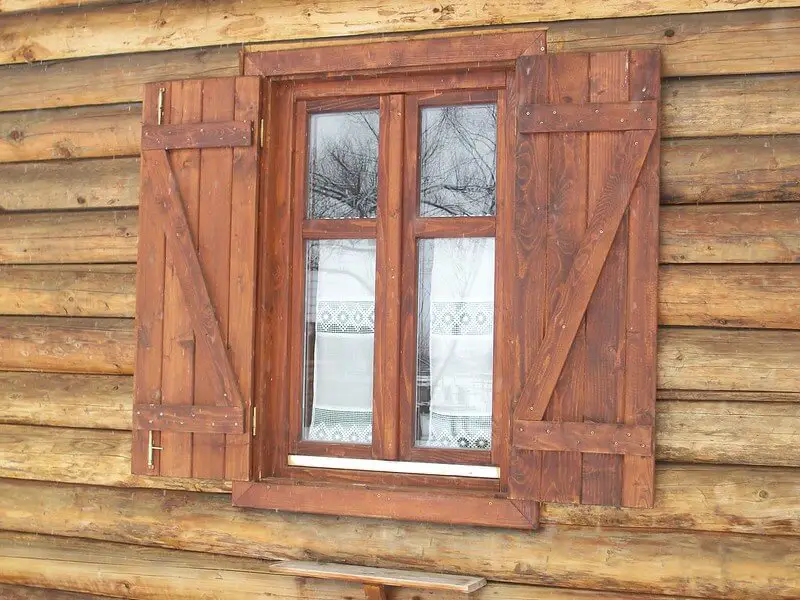Are you having difficulty deciding on woods for outdoor shutters? Worry no more because we’ve made things easier for you. This article will discuss the five best kinds of wood you can use for your project.
How To Choose Wood for Outdoor Shutter
Choosing the right wood for any project can be a daunting task. After all, there are thousands of tree species out there.
When choosing wood for an outdoor shutter, go for one that has the following characteristics;
- Readily available. The availability of wood affects its cost. A certain type of wood will be cheaper if it is readily available in your area.
- Attractive. An outdoor shutter does more than improve the security of your home. It adds to its aesthetic value too. Thus, the wood you go for should be attractive to the eye, with or without a finish.
- Lightweight. Light wood is usually easy to work with. It’s also easy to install and can be customized into various designs.
- Weather resistant. Going for wood that won’t warp, shrink, or swell when exposed to outdoor elements is in your best interest.
- Rot/insect resistant. Your preferred wood should be resistant to decay and insect attacks.
- Low-maintenance. Choosing wood with minimal maintenance requirements will save you money in the long run.
5 Types of Woods for Outdoor Shutter
1. Redwood
| Feature | Comment |
| Density | Light weight |
| Weather resistance | High |
| Rot resistance | High |
| Workability | Good |
| Maintenance requirements | Minimal |
The redwood is one of the strongest softwoods out there. It has great dimensional stability and is less prone to splintering and splitting. It is denser than other softwoods such as cedar and is, therefore, more durable.
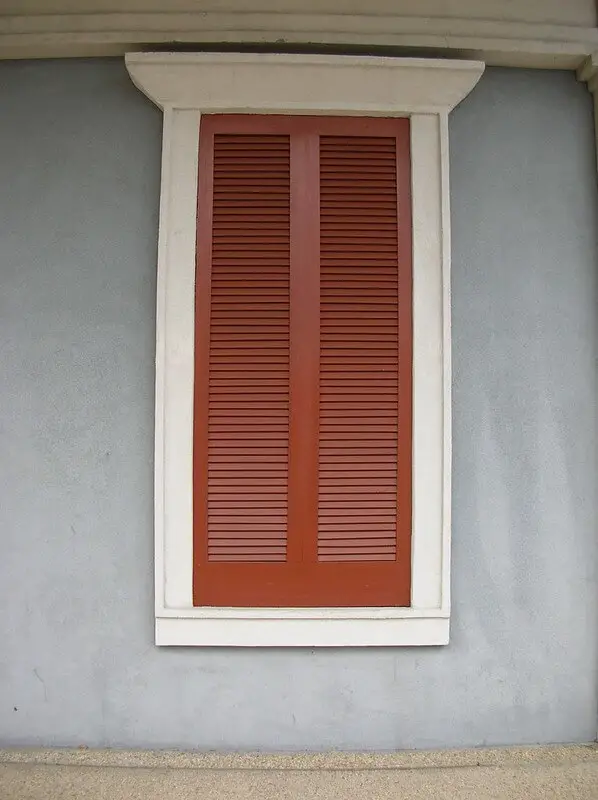
This wood has a decent strength-to-weight ratio. It’s also light, a property that enhances its workability.
Redwood is popular for its beautiful natural color. It has an appealing reddish-brown hue that gradually weathers into a gray color if the wood is left unfinished.
It contains tannins that make it highly resistant to decay and insect attacks. The wood is also resistant to fire.
Redwood works well even without a finish. As such, the wood has very minimal maintenance requirements. You’ll only need to seal the wood if you want your shutters to have that natural reddish-brown hue. Otherwise, if you’re okay with a silver-gray patina, you can leave your shutters unfinished.
2. Cypress
| Feature | Comment |
| Density | Light weight |
| Weather resistance | High |
| Rot resistance | High |
| Workability | Good |
| Maintenance requirements | Minimal |
Cypress has a straight grain with an even to medium texture. It also has a moderate natural luster.
Cypress is stronger than softwoods such as cedar. However, it is light in weight and easy to work with.
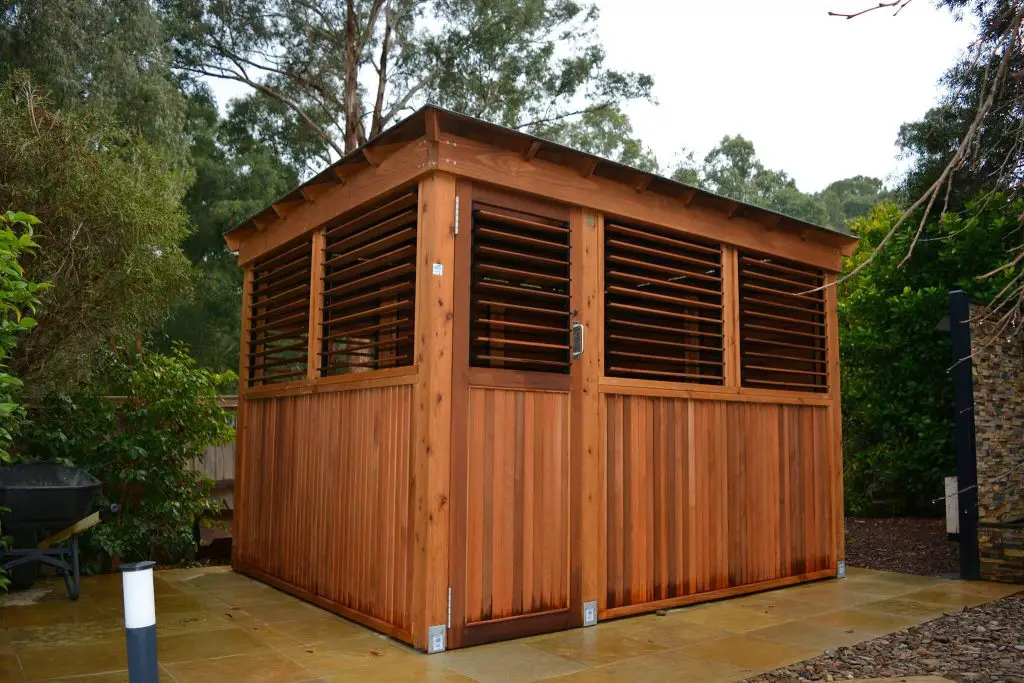
This wood can withstand outdoor elements well. It also contains a natural preservative known as Cypressene that protects the wood from insect attacks and decay.
Cypress has an appealing yellowish-brown color. The wood weathers into a gray color when left unfinished. Like redwood, cypress has minimal maintenance requirements. It can withstand outdoor elements nicely, even without a finish.
3. Cedar
| Feature | Comment |
| Density | Light weight |
| Weather resistance | High |
| Rot resistance | High |
| Workability | Good |
| Maintenance requirements | Minimal |
The western red cedar is one of the commonly used woods for outdoor shutters. This wood has a straight grain with an even texture. Its color ranges from pinkish to reddish-brown. The color weathers into a beautiful silver-gray patina when exposed to outdoor weather.
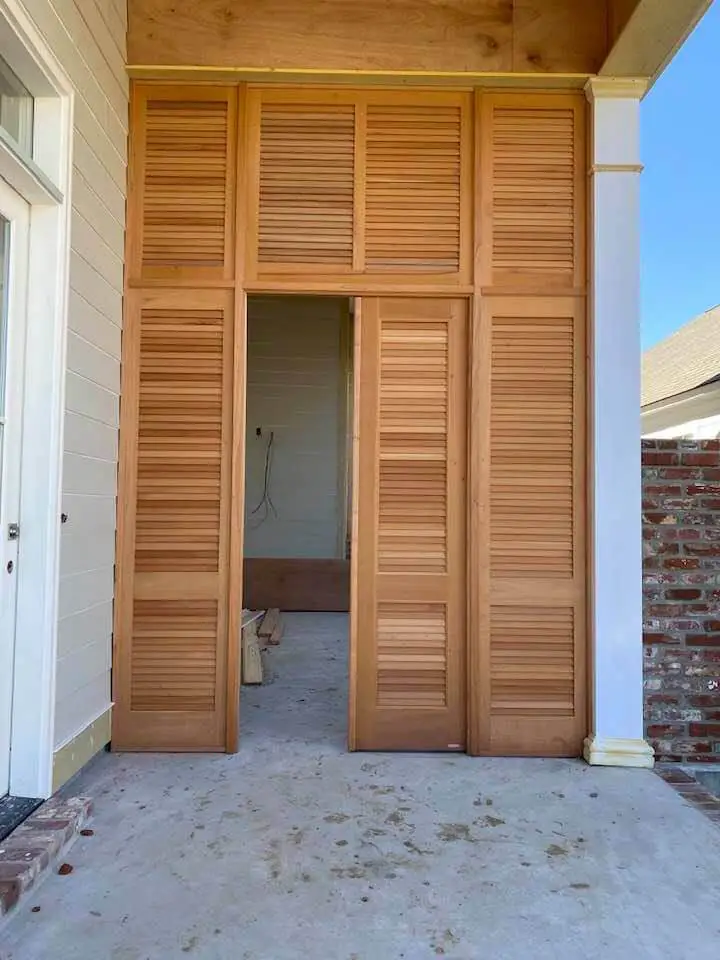
This wood is not only beautiful, but it is also very durable too. Cedar fibers contain a substance known as thujaplicins. They play an important role in protecting the wood from decay and moisture. Its distinct scent also protects the wood from insect attacks.
Cedar is lightweight and thus easy to work with. It machines well and has a high holding capacity for nails and screws. It is also less resinous, which makes it easy to finish.
Cedar is one of the softwoods that withstand outdoor elements nicely. It is dimensionally stable and thus less prone to warping or twisting.
This wood is naturally resistant to decay, insect attacks, and outdoor weather. It, therefore, has minimal maintenance requirements and can serve you well even without a finish.
4. Mahogany
| Feature | Comment |
| Density | Lightweight |
| Weather resistance | Fair |
| Rot resistance | Good |
| Workability | Good |
| Maintenance requirements | Minimal |
Just like redwood, mahogany is popular for its beautiful natural color. The wood also has a straight grain with a fine, even texture.
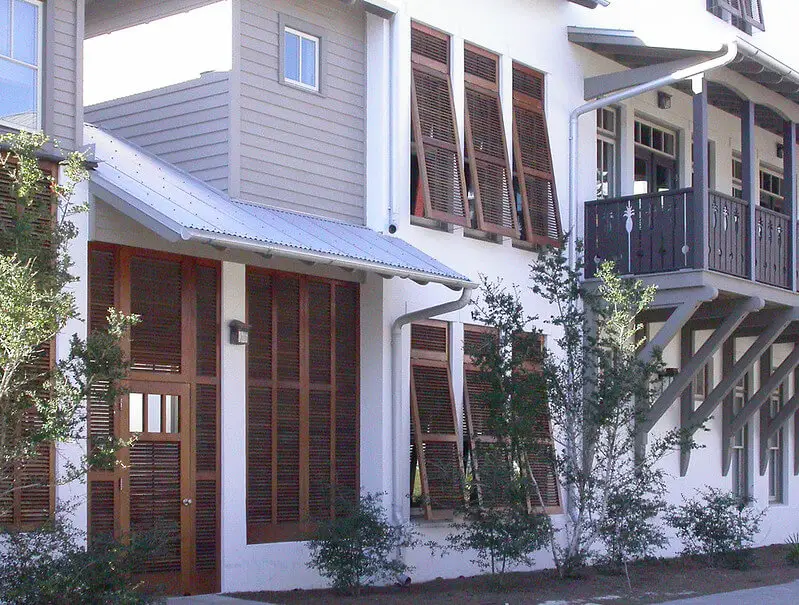
Mahogany is relatively stable when exposed to outdoor elements. It is less prone to warping, shrinking, and swelling. However, its reddish-brown hue darkens when exposed to direct sunlight.
Mahogany is light and thus easy to work with. It’s also dense and has high resistance to rot. It has moderate resistance to insect attacks.
Since this wood darkens when exposed to direct sunlight, you must finish it to retain its natural color. It finishes well with a stain.
5. Douglas Fir
| Feature | Comment |
| Density | Lightweight |
| Weather resistance | Good |
| Rot resistance | Good |
| Workability | Moderate |
| Maintenance requirements | Minimal |
The Douglas fir has a straight grain with medium to coarse texture. It also has a moderate natural luster.
This wood has relatively good workability with a moderate blunting effect on cutters. It finishes well with a stain.
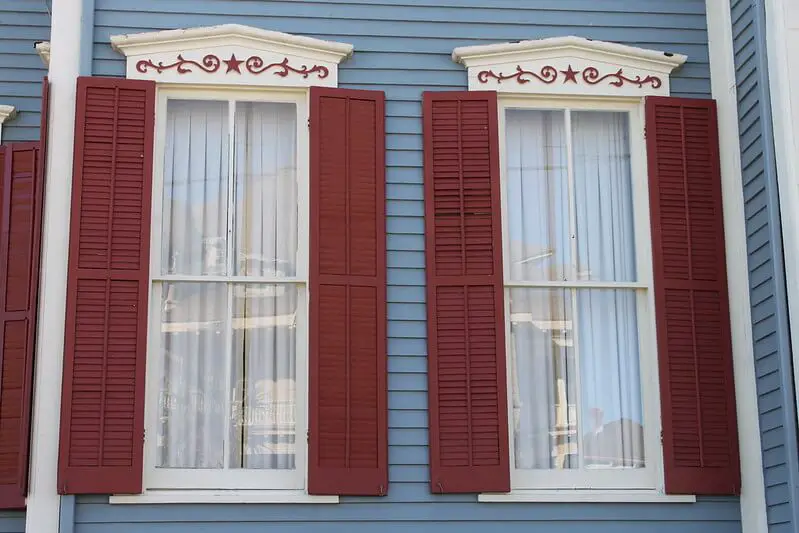
This wood is very stable. It dries fasters and undergoes minimal dimensional movement during the drying period. It’s elastic and therefore less prone to checking or shrinking.
Douglas Fir can withstand outdoor weather well and is highly resistant to decay. This wood has one shortcoming; it is vulnerable to insect attack. Thus, it requires extra maintenance to protect it from bugs and termites.
read related post
Conclusion: Best Woods for Outdoor Shutter
The best wood for the outdoor shutter is redwood, cypress, cedar, mahogany, and Douglas fir. These woods can resist outdoor weather well and are highly resistant to decay. Some, such as redwood, cypress, and cedar, have minimal maintenance requirements and serve you well even without a finish. They have good workability, which makes the installation process easy. So, there you have it, go ahead and pick the one that best suits your project.

